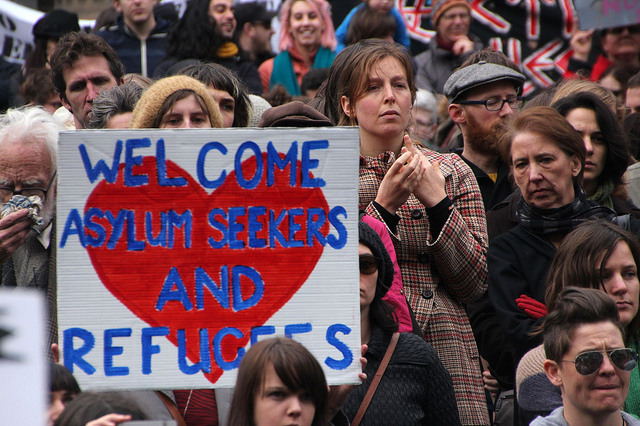Canada News
Ottawa and Quebec reach agreements to ease tensions over asylum seekers

FILE: Last year, Quebec received roughly 25,000 asylum seekers who entered through legal and illegal border crossings, representing half of the total in Canada.(Photo: Takver/Flickr, CC BY-SA 2.0)
OTTAWA — Rising tensions between Quebec and the federal government eased Wednesday night after new agreements were struck aimed at helping the province deal with an ongoing surge in asylum seekers crossing the Canada-U.S. border.
Following a meeting of the ad hoc intergovernmental task force on irregular migration in Ottawa, Quebec Immigration Minister David Heurtel said he felt some progress had finally been made on measures he has been calling for to help his province deal with mounting pressures caused by the spike in irregular migrants.
“We’ve been proposing solutions and tonight there was a real openness for solutions.”
A working group has been struck to reach an agreement on how Quebec will be reimbursed for $146 million in unanticipated costs it says it has shouldered as a result of the influx of border crossers last year.
A triage system will be also set up to ask asylum seekers arriving in Quebec where in Canada they are ultimately hoping to stay — something Heurtel said he has also been pushing for.
He wants Ottawa to help those aiming to settle outside of Quebec to get where they want to go. For those who want to stay, work permits are now being issued faster thanks to a recent cut in wait times.
“All of these measures will lessen the pressure on Montreal, because in Montreal the resources are saturated,” Heurtel told reporters.
Transport Minister Marc Garneau, who chairs the task force, said work will continue to continue diplomatic efforts with the U.S. to stop the flow of irregular migrants, which border officials expect to spike again this summer.
Crossings into Canada outside legal border checkpoints exploded in 2017.
Last year, Quebec received roughly 25,000 asylum seekers who entered through legal and illegal border crossings, representing half of the total in Canada.
So far this year, 6,074 people have entered the province from the United States — triple the number of people compared with the same period in 2017.
Tensions between Ottawa and Quebec were sparked this week after federal Immigration Minister Ahmed Hussen seemed to chastise the province for its current handling of asylum seekers in a letter responding to Quebec’s calls for help.
“While last summer, Quebec was operating 13 temporary shelters to welcome asylum seekers, I have noticed that only four are currently available,” Hussen said in his letter, a copy of which was obtained by The Canadian Press.
“This risks creating delays at the border and triggering an unacceptable humanitarian situation. We need to avoid causing undue suffering to families who are seeking protection.”
Quebec Premier Philippe Couillard said this response to his request for assistance on the refugee crisis reflected “a complete ignorance” of what’s going on at the border between his province and New York state.
Hussen took a more conciliatory tone Wednesday after the meeting, acknowledging the role Quebec has played in taking in so many asylum seekers and stressing the “amazing relationship” Ottawa shares with the province.
Hussen said he was able to offer Quebec assurances that $74 million has been earmarked to reduce extensive backlogs that currently exist for migrants to have their refugee claims processed.
“A lot of work has been done, it’s just that these meetings allow us to come back, reassess, see where the new pressure points are then move forward with new solutions,” Hussen said.
Meanwhile, Immigration and refugee lawyer Stephane Handfield says the federal government should temporarily suspend an agreement with the U.S. known as the “Safe Third Country Agreement.”
The Safe Third Country agreement, which took effect in 2004, disallows asylum seekers from presenting themselves at an official port of entry to ask for refugee protection. They can only claim refugee status from inside Canada, which is why thousands have been crossing through unofficial entry points on foot.
“Suspending the agreement won’t diminish the number of people asking for asylum,” Handfield said in an interview. “But it will stop giving them an incentive to cross illegally.”
Suspending the agreement is a politically charged decision, because doing so would signal to the United States that Canada no longer thinks its southern neighbour is a “safe” place for refugees.
Handfield said Canada used to receive almost as many refugee applicants in the late 1990s and early 2000s as it does now, but the country had significant more resources then.
The lack of human resources explains the explosion in wait times for treatment of asylum claims, he said.
Handfield used to be a member of the Immigration and Refugee Board of Canada until 2005. Back then, he said, 70 members would hear asylum applications for the territory of Quebec.
“Today there are 30 members,” he lamented. “And they have to manage an area from Ottawa to the Maritimes. And we are somehow surprised that delays are exploding.”
— With files from Giuseppe Valiante in Montreal and Caroline Plante in Quebec City





















